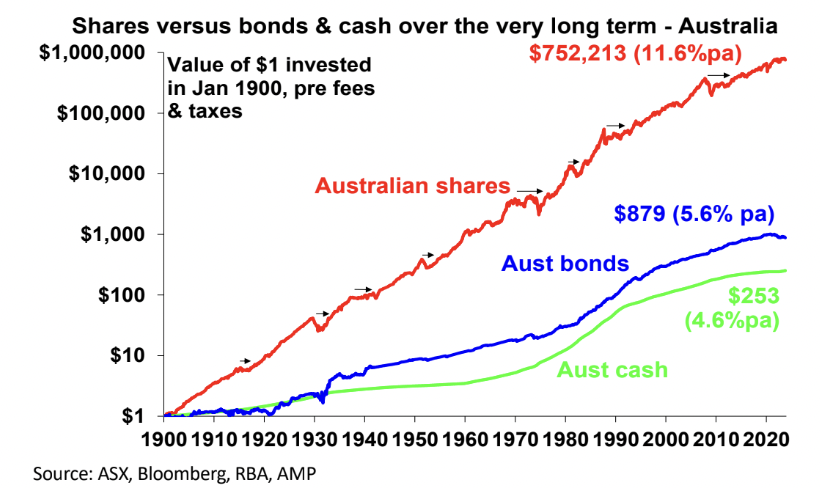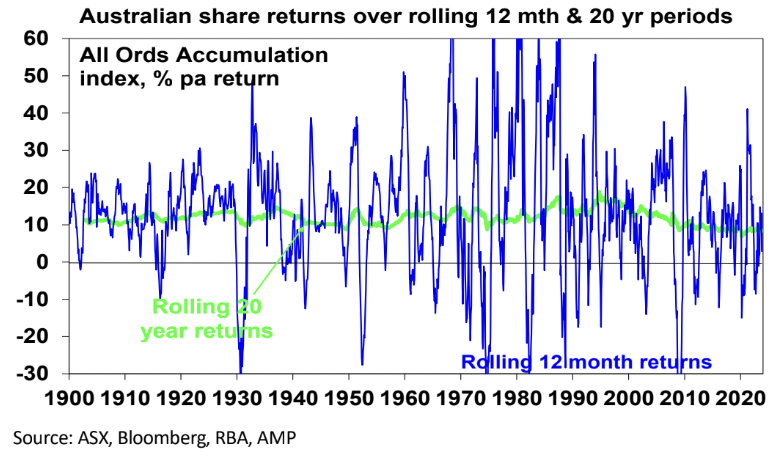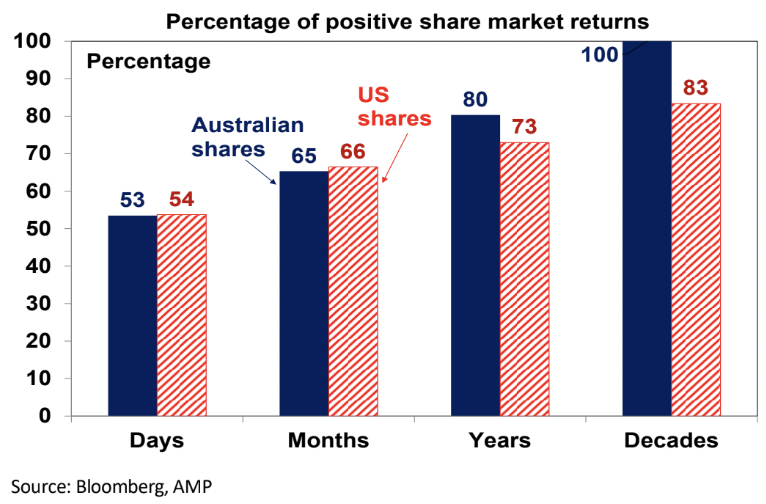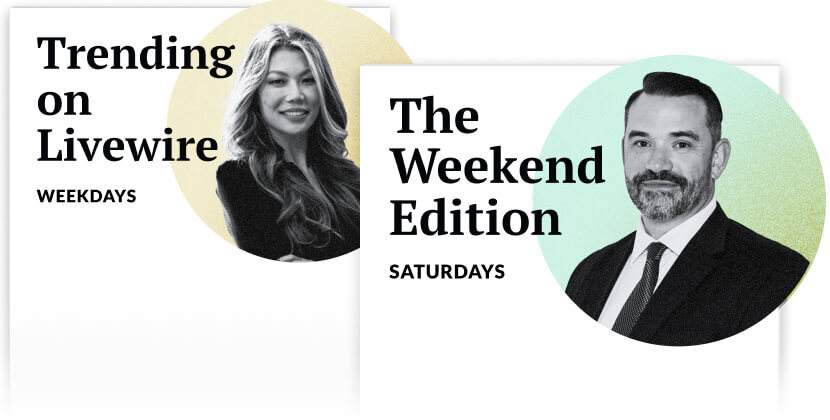9 key things for successful investing
Uncertainty is magnified by perennial predictions of a crash and then periodically by talk of the next best thing that’s going to make us rich.
It would be nice if the investment world was neat and predictable, but it’s well known for sucking investors in during good times and spitting them out during bad times. If anything, it’s getting harder reflecting a surge in the flow of information and opinion. This has been magnified by social media where everyone is vying for attention and the best way to get this is via headlines of impending crises. This all adds to investor uncertainty and erratic investment decisions.
With this in mind, I have written regularly about nine key things for investors to bear in mind to be successful. This note provides a reminder.

Make the most of the power of compound interest
The next chart shows the value of one dollar invested in 1900 in Australian cash, bonds and equities with interest and dividends reinvested along the way, before fees and taxes. That one dollar would be worth $253 today if it had been invested in cash.
But if it had been invested in bonds it would be worth $879 and if it had been allocated to shares it would be worth $752,213. Although the average return on shares (11.6% pa) is just double that on bonds (5.9% pa), the magic of compounding higher returns leads to a substantially higher balance.
Of course, there is no free lunch and the price for higher returns is higher volatility but the impact of compounding returns from growth assets is huge over long periods.

The likely end of the secular decline in inflation and interest rates over the last few decades which supercharged investment returns means average returns over the next decade or so will be somewhat more constrained than we have become used to.
But shares offering a dividend yield of 4% (5% or more with franking credits) should still provide superior medium-term returns and hence grow wealth better than bonds where the 10-year yield is 4.50% pa. Unfortunately making the most of the magic of compounding returns can be one of the hardest things to do.
Don’t get thrown off by the cycle

Looked at in a long-term context, the 20% or so plunge in share seen into October last year was just another cyclical swing, after which markets rebounded. The key is not to get thrown off when markets plunge.
Invest for the long-term
As JK Galbraith observed: “There are two kinds of forecasters: those who don’t know, and those who don’t know they don’t know.”
Usually the grander the forecast the greater the need for scepticism as such calls invariably get the timing wrong or are dead wrong. If getting markets right were easy, then the prognosticators would be mega-rich and would have stopped doing it.
Related to this many get it wrong by letting blind faith – eg, “there is too much debt” – get in the way of good decisions. They may be right one day, but an investor can lose a lot in the interim.
The problem is that it’s not getting easier as the world is getting noisier. This has all been evident through the pandemic and its high inflation aftermath with all sorts of forecasts as to where markets would go, most of which provided little help in actually getting the big swings right. Given the difficulty in getting market moves right in the short-term, for most it’s best to get a long-term plan that suits your level of wealth, age, tolerance of volatility, and stick to it. Focus on the green 20-year return line in the previous chart rather than short-term swings.
Diversify
Similarly listed assets (like shares) and unlisted assets (like property) often perform differently through the cycle. The key is to have a mix of investments.
Turn down the noise
But much of this information and opinion is of poor quality. As “bad news sells” there has always been pressure to put the negative news on the front page of newspapers but there was hopefully some balance in the rest of the paper. In a digital world, each story can be tracked via clicks so the pressure to run with sensationalised and often bad news headlines is magnified.
This has gone into hyperdrive since the pandemic – with a massively stepped-up flow of economic information. This may be of use in providing timely information on how the economy is travelling but it’s also added immensely to the flow of information and often it’s contradictory. The heightened uncertainty is leading to shorter investment horizons which in turn can add to the risk that you could be thrown off well-thought-out investment strategies.
The key is to turn down the volume on all this noise. This also means keeping your investment strategy relatively simple. So don’t waste too much time on individual shares or funds as it’s your high-level asset allocation that will mainly drive the return and volatility you will get. Here are several tips to help turn down the noise:
- Put the worries in context – there have been plenty of worries over the last century and yet long-term investment returns have been fine.
- Recognise it’s normal for markets to swing around in the short term.
- Focus on only a few reliable news services and turn off all “notifications” on your smart device
- Don’t check your investments so regularly – on a day-to-day basis it’s a coin toss as to whether the share market will rise or fall but the longer you stretch it out between looking at your investments the more likely you will get positive news. See the next chart.

Buy low, sell high
Unfortunately, many do the opposite, ie, selling after a collapse and buying after a big rally...which just has the effect of destroying wealth even though it might feel good at the time amid panic (or euphoria). Again, turn down the noise!
Beware the crowd at extremes
As Warren Buffett has said, the key is to "be fearful when others are greedy and greedy when others are fearful".
Focus on investments with sustainable cash flow
Seek advice
However, a good approach is to seek advice via an investment information and/or advisory service or a coach such as a financial adviser, in much the same way you might use a specialist to look after your plumbing or medical needs. As with plumbers and doctors, it pays to shop around to find a service or adviser you are comfortable with and can trust.
Welcome to Livewire, Australia’s most trusted source of investment insights and analysis.
To continue reading this wire and get unlimited access to Livewire, join for free now and become a more informed and confident investor.
Join Free to unlock all exclusive content
To continue reading and gain unlimited access to all Livewire content, join free to become a more informed, confident investor.
3 topics

